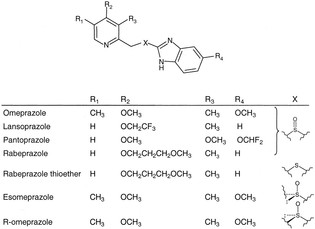
The most common side effects of proton pump inhibitors include are headache, nausea, stomach pain, dry mouth, diarrhea, gas, constipation and drowsiness. Moderate side effects might be flu- or allergy-like, feelings of tightness in the chest and difficulty breezing.
Studies have shown PPIs to be associated with a twofold increase in the risk of Clostridium difficile colitis and a more than threefold increase in the risk of other enteric infections.
PPIs may also be associated with an increased risk of ambulatory pneumonia, although this association is subject to controversy.
Several observational studies have shown an association between long-term PPI use and fractures of both the hip and vertebrae, possibly due to achlorhydria, leading to mal-absorption and deficiencies of calcium and vitamin B12 and subsequent bone loss. Vitamin B12 deficiency is also associated with cognitive decline. Research revealed significant increase in risk of dementia with use of PPIs, especially in the 75-79 age group.
